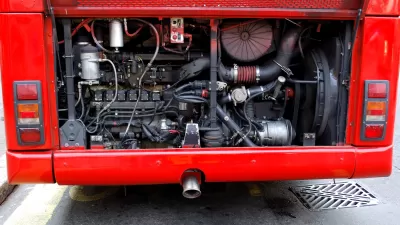Three whammy’s are pressing America’s luck this spring as the nation engages in one of the most exciting presidential elections in my lifetime. The problem is that the only solution that has been proposed at the national-level has been a gas tax holiday. A gas tax holiday would have the effect of starving our increasingly troubled transportation system of the necessary funds to maintain and improve infrastructure and service.
Three whammy's are pressing America's luck this spring as the nation engages in one of the most exciting presidential elections in my lifetime. The problem is that the only solution that has been proposed at the national-level has been a gas tax holiday. A gas tax holiday would have the effect of starving our increasingly troubled transportation system of the necessary funds to maintain and improve infrastructure and service.
I would love to see a presidential debate about the future of transportation in America. This debate would address the three whammy's facing transportation in America:
Whammy # 1 – Rising fuel costs
Rising fuel may come as a shock to Americans but some have seen this day coming for a half century. In 1956, Dr. Hubbard, a geologist for Shell, predicted that American oil would peak in 1970. Dr. Hubbard was correct. He also predicted that global oil production would peak around the year 2000. Due to the oil shock in the late 1970s, which resulted in less fuel consumption, the peak was delayed by nearly a decade. It appears that Dr. Hubbard may be correct a second time.
The problem is that America is ill prepared to leave our vehicles at home. Most suburbs and towns have been designed with low-density land uses, which do not support public transit, walking, or bicycling. Despite this, American's are using transit in record numbers. Park-and-rides are overflowing and buses and trains are full.
Whammy # 2 – Transit agencies cannot afford fuel
Across America, transit agencies have to cut service at a time when we need transit more than ever before. This is because the cost of fuel is outpacing farebox revenues. This insult to injury hurts working class Americans the most. In recent weeks Miami and Denver announced major service cuts to their transit system. Unfortunately, more transit systems are sure to follow unless the federal government steps in and provides some financial relief.
Whammy # 3 – Gas and sales tax revenues are down
A major source for funding transportation service and infrastructure comes from gas and sales taxes. The federal government, as well as many state governments, collect gas taxes to fund transportation capital improvements. Many cities use a sales tax to fund transit operations. As increased fuel prices pinch our economy, people spend less, thus resulting in fewer gas and sales tax revenues to support our transportation system.
These three whammy's are resulting in a downward economic spiral that needs presidential attention.
The problem with America is that we have lost our vision. The post-WWII generation, emerging from turbulent times, had high hopes for a better future. This future focused on how transportation and new development patterns could improve the lives of the average working class American. The outward expansion of highways and suburbs of the 1950s, '60s and '70s provided mobility for a growing economy.
Fifty years later, we once again need a national hope for how transportation and new development patterns can improve our lives. This time the hope is for creating a balanced, multimodal transportation system with cities designed for walking, bicycling, and public transit. Our hope for the 21st century is to reuse what we have overlooked. We need to embrace a new green economy that creates solutions beyond fossil fuels. The green economy of the 21st century will be based on using our resources better and minizing waste.
Unfortunately, none of this is possible without money and a vision. Rather than discussing how a gas tax holiday can help America for a few months this summer, we need our presidential candidates to begin a real discussion about how our country can create a sustainable transport system for the 21st century.


Planetizen Federal Action Tracker
A weekly monitor of how Trump’s orders and actions are impacting planners and planning in America.

San Francisco's School District Spent $105M To Build Affordable Housing for Teachers — And That's Just the Beginning
SFUSD joins a growing list of school districts using their land holdings to address housing affordability challenges faced by their own employees.

The Tiny, Adorable $7,000 Car Turning Japan Onto EVs
The single seat Mibot charges from a regular plug as quickly as an iPad, and is about half the price of an average EV.

Seattle's Plan for Adopting Driverless Cars
Equity, safety, accessibility and affordability are front of mind as the city prepares for robotaxis and other autonomous vehicles.

As Trump Phases Out FEMA, Is It Time to Flee the Floodplains?
With less federal funding available for disaster relief efforts, the need to relocate at-risk communities is more urgent than ever.

With Protected Lanes, 460% More People Commute by Bike
For those needing more ammo, more data proving what we already knew is here.
Urban Design for Planners 1: Software Tools
This six-course series explores essential urban design concepts using open source software and equips planners with the tools they need to participate fully in the urban design process.
Planning for Universal Design
Learn the tools for implementing Universal Design in planning regulations.
Smith Gee Studio
City of Charlotte
City of Camden Redevelopment Agency
City of Astoria
Transportation Research & Education Center (TREC) at Portland State University
US High Speed Rail Association
City of Camden Redevelopment Agency
Municipality of Princeton (NJ)




























